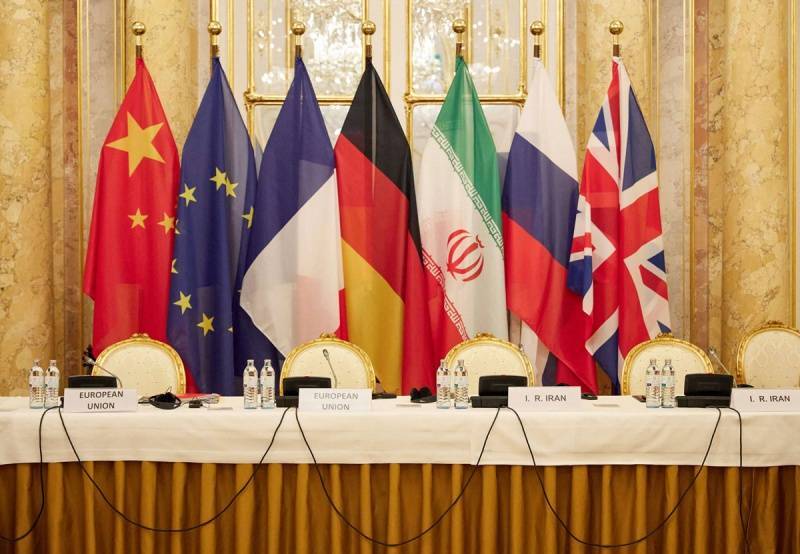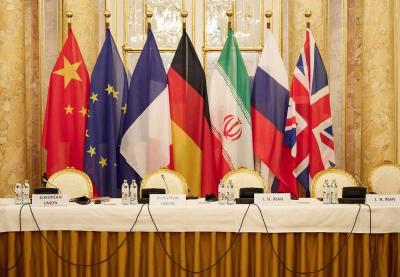It was unexpected for those following the Vienna rounds related to the nuclear agreement that the tripartite statement issued by Germany, France, and Britain adopted other options to be explored with their international partners in engaging with Iran. The three countries, which have long endeavored to market the revival of the agreement as a necessity and to curtail Israeli calls to halt negotiations with Tehran, deemed this time that there is no reason preventing Iran from seizing the diplomatic opportunity and that there would be no agreement with Tehran in the near future.
The European goal was clear in the statement by German Chancellor Olaf Scholz during the press conference he held with Israeli Prime Minister Yair Lapid: “We all agree that it is important for Iran not to develop nuclear weapons or missiles capable of delivering these weapons; that is our overarching goal.” He added that “returning to the nuclear agreement under the current conditions would be a grave mistake that will destabilize the Middle East and create an arms race that could endanger the entire world,” and that “there is another path that should be taken, and we have discussed the need for a new strategy to stop Iran’s nuclear program.”
In another area related to European security, changes in the battlefield in Eastern Ukraine showcase European and American successes against the Russian invasion that have led to significant retreats for Moscow, forcing it to lose thousands of kilometers in exchange for preserving the lives of its soldiers and threatening its dream of achieving independence in Donbas.
**Europe Before Diplomatic Inability**
The total immersion of the European Union and its allies in military and economic support for Ukraine, and their assistance to countries in overcoming anticipated energy difficulties, indicates a European awareness of the criticality of the upcoming phase and the ineffectiveness of the diplomatic option. The indicators carried by the recent meeting of the defense contact group concerned with Ukraine, held at the U.S. Ramstein Air Base in Germany, which included 48 countries and two international organizations, and concluded with a decision to activate defense industrial bases and coordinate their work to ensure effective defense for Ukraine, are mere signs that Europe has changed rapidly, and that the looming danger to its existence and role has become a fixed reality.
Regardless of the expected successes, whether in the nuclear file or in Ukraine, Europe, particularly its poles, notably France and Germany, are transitioning from a mentality of “maintaining the status quo and trying to exploit it,” which has characterized its international relations and its handling of crises—evident in its constant attempts to repair the nuclear agreement, its role and position on the Syrian war and other regional crises—to a stance of proactive confrontation after years of marginalization experienced under the United States since the end of the Cold War.
The entire international mood is undergoing a revolutionary phase that differs from all previous stages with its constants and priorities and alliances as a result of failures in crisis management, particularly economic and political crises, and the reliance upon ethnic and religious conflict strategies, undermining regimes from within, and deliberate impoverishment as a means to control nations' resources. Last October, U.S. special envoy to Iran Robert Malley hinted in a conversation with Aaron David Miller from the Carnegie Endowment for International Peace that the Biden administration team dealing with Iran is working on a “Plan B.”
**Iran in Turmoil**
A dual approach to the war ongoing in Ukraine on one hand, and the stalled nuclear negotiations and the clear European stance on Iran possessing a nuclear bomb or its missile program on the other hand, presents a set of common denominators between them, both at an alliance level and in terms of conflicting interests, allowing for the emergence of two opposing axes where Iran, with its current positions, appears to be the most significant factor and the hottest point of intersection between them. Iran, present in the nuclear arena defying the International Atomic Energy Agency’s decisions, is also present in all arenas of regional and international turmoil, including the European arenas in Ukraine, and recently in Albania, which represents an obligatory Arab test concerning the development of European and American relations with Arab countries.
The confrontation strategy that Europe has transitioned to, not only at the European level but also regarding the nuclear weapons and Iranian missiles issue, opens wide the door for developing Arab-European relations, and a new European role is taking shape concerning regional security, not from a position of a tolerant mediator but from an intervening standpoint, especially through the gas avenues in the Eastern Mediterranean with its economic and security dimensions and implications for Europe's vital space. This description of the new European role aligns with Israeli Defense Minister Benny Gantz's statement after meeting with UN Secretary-General Antonio Guterres in New York early this week, discussing the formation of an international front to address challenges, primarily the “Iranian threat,” and the necessity to “expand cooperation with regional partners to confront Iran... and ensure a credible military force for deterrence regardless of the diplomatic solution.”
So, will the new Europe, which banks on Eastern Mediterranean gas, co-exist with Iranian missiles in Lebanon and Syria, or will it become the spearhead in leading a European security role in the Eastern Mediterranean?




